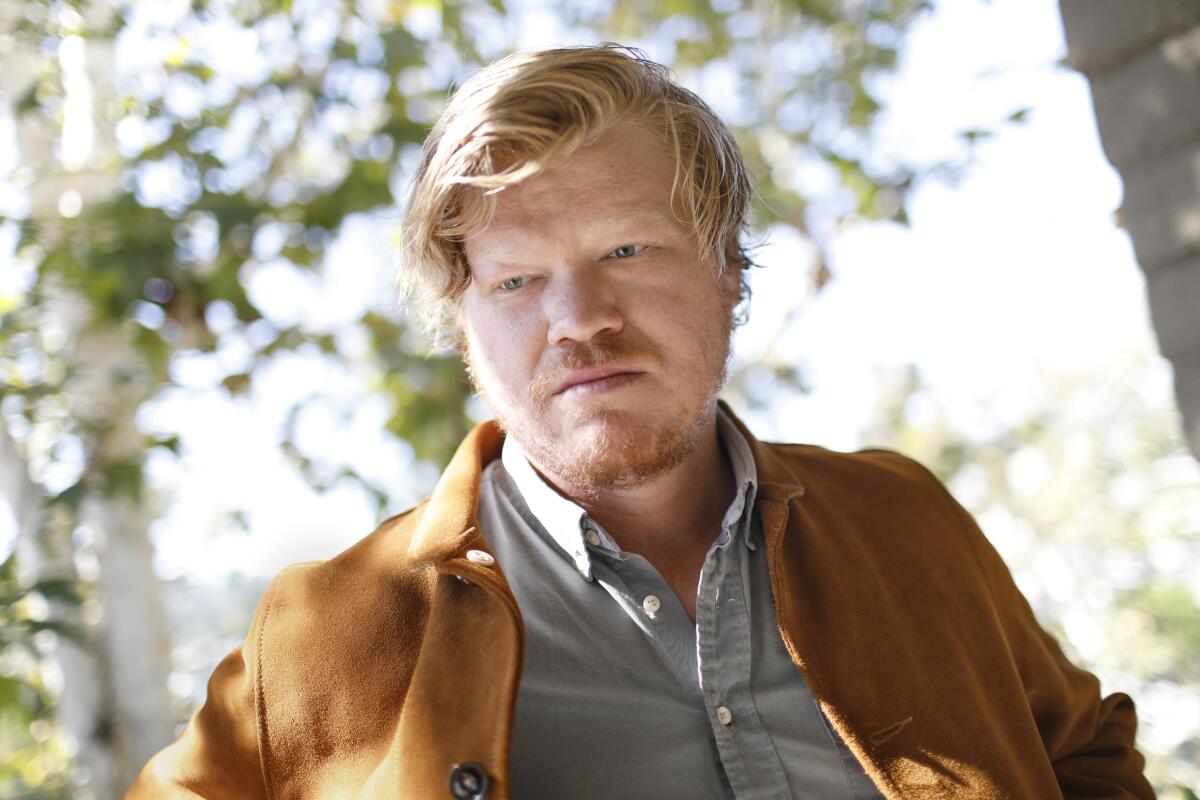Being one of TV’s best character actors suits Jesse Plemons just fine

- Share via
Jesse Plemons is an unassuming fella, with soft, round features and ginger hair. The Texas native, 31, is neither especially broad nor especially thin; his height is average, his manner polite. He’s thoughtful — pausing to consider my questions before leaping to answer them — but never stentorian. And he’s so quiet when he speaks that I catch myself worrying if the recorder will pick up his voice over the rumble of the air conditioner.
In other words, you wouldn’t know from meeting Jesse Plemons that he’s one of the finest character actors of his generation. But he is.
The relationship between Bryan Cranston’s Walter White and Aaron Paul’s Jesse Pinkman defined “Breaking Bad.” Without it, Netflix’s follow-up falls flat.
As sidekick Landry Clarke in the high-school football drama “Friday Night Lights,” devoted husband (and human butcher) Ed Blumquist in Season 2 of “Fargo,” and socially awkward game developer Robert Daly in the “Star Trek”-themed “Black Mirror” episode “USS Callister,” Plemons has distinguished himself by playing the indistinguishable: unassuming fellas with a dark streak lurking within.
In “Breaking Bad” and now “El Camino: A Breaking Bad Movie,” Plemons perfects the role, as he once described it, of “the guy that you would not expect to shoot someone.” His Todd Alquist, the cold-blooded white supremacist gang member who imprisons and tortures “El Camino’s” hero, Jesse Pinkman (Aaron Paul), also listens to yacht rock, collects snow globes and paints his apartment in perky pastels. It is the definition of a scene-stealing performance: unexpected, profoundly strange, impossible to turn your eyes from. And it’s the sort of role Plemons remains most eager to play.
“I’m drawn to characters that there’s more space to fill in and more room to explore — where it’s not so cut-and-dried,” Plemons says, sitting amid the orange accents of the appropriately ranch-like Garland hotel in North Hollywood. “Those are the performances I’m drawn to. You know, when you’re watching as an audience member, and you’re not quite sure how to feel about them or how they’re feeling in a certain moment? I feel like that’s how people are. I’m amazed at how well some people I’ve known can mask their depression or whatever. People don’t let on so easily. People are pretty good at putting on a face.”
Plemons’ own talent for doing so has made him a favorite of television’s most prominent fatalists: “Breaking Bad’s” Vince Gilligan, “Fargo’s” Noah Hawley and “Black Mirror’s” Charlie Brooker, auteurs for whom man’s capacity for psychic and physical violence is a central subject. What separates Plemons is his willingness to leaven even the most monstrous characters with grace notes — humor, pathos, even kindness. (“It’s so funny to hear Vince talk about Todd,” Plemons laughs, putting on Gilligan’s voice: ‘Oh, he’s a nice guy. Todd’s a great guy! He just happens to, you know …’”) At one point in “El Camino,” as he drives Jesse into the desert to help dispose of a body, Todd sings along to “Sharing the Night Together” on the radio, his arm hanging out the window.
“I’m drawn to characters that there’s more space to fill in and more room to explore — where it’s not so cut-and-dried ... People are pretty good at putting on a face.”
— Jesse Plemons
“I’d forgot what it was like to read a ‘Breaking Bad’ script,” Plemons says of his first encounter with the scene. “There’s no one that writes quite like Vince. He uses the stage direction in a way that — he’s almost just, like, stringing you along with little bits of information. … I got to the sequence where I’m on our best friends road trip with the maid in the back as I’m singing along to some Dr. Hook. I’m like ‘Wow, that’s my favorite Todd moment yet.’”
This and the other details about Todd’s home life that litter “El Camino” allowed Plemons to understand the character better, he says: “Everything is so off-kilter. It’s like looking inside his brain, that apartment. There’s a real order, but there’s also an absolute chaos.”
Plemons wasn’t always privy to such information. When he was cast in “Breaking Bad,” during its bifurcated final season, Gilligan gave the actor only a short character breakdown, which Plemons, who’d never seen the series, coupled with a weeklong binge in an Albuquerque hotel room. What Gilligan failed to mention was that Plemons’ second appearance on the show, in the 2012 episode “Dead Freight,” would feature Todd shooting a preteen boy who witnesses a heist.
“The first season, I was getting the scripts a few days in advance,” he remembers. “I had a few sentences from Vince to sort of base the entire character on and had to trust my instincts and hope for the best and try not to mess this show up that everyone was loving so much. … I had no idea Todd was going to shoot this kid two episodes in!”
Seven years later, “El Camino” suggests the confidence that comes with experience. Plemons combines precise gestures — signaling a trucker to honk with almost childlike innocence, for instance — and Todd’s earnest patter with the traumatized Jesse to create a portrait of malice so unsettling I found myself rooting for him to stick around, if only to keep things interesting. It’s part of a lifelong learning process for the former child actor, one that’s only accelerated since he broke through in “Friday Night Lights.”
“I’m not quite as hard on myself as I was when I was younger, but at the same time, there’s a nice ignorance that comes along with being young,” Plemons says, when asked how he’s evolved as an actor. “When you’re 19, 20, 21, there’s the willingness to jump into something without full grasping the repercussions.”
That leap of faith has since nabbed him two Emmy nominations, for “Fargo” (2016) and “Black Mirror” (2018), not to mention a memorable moment opposite screen legend Al Pacino in Martin Scorsese’s highly anticipated Netflix saga, “The Irishman.”
“The first day on ‘The Irishman,’ I was just listening to Pacino rant about John F. Kennedy, and I left that day thinking I was fairly relaxed,” he says. “’It’s the same thing. It’s just that it’s Pacino ranting in this scene.’ And then I worked a few more days and I was like, ‘No, this is not the same thing at all.’ … It’s exactly what you aspire to in the beginning. Working with the best. Learning from the best.”
Though Plemons says he never thought his career would take off this quickly (“It’s wild,” he marvels), it’s clear his thoughtful choices have steered him to success. And while he’s enjoying stretching his legs in roles that require him to “put it all on the surface” — in Disney’s forthcoming “Jungle Cruise,” with Dwayne Johnson and Emily Blunt, he’s “an evil German prince circa 1916” — he claims not to be interested in playing a traditional hero. And unlike the characters on which he’s cut his teeth, Plemons’ own unassuming nature is sincere. Which means he’s happy to keep playing second fiddle and to do so brilliantly.
“I like having to lean in and figure it out,” he says. “I’m not really interested in playing a hero that has zero flaws. That’s not that enticing to me. The bad guys and the supporting parts are often more fun.”
More to Read
The complete guide to home viewing
Get Screen Gab for everything about the TV shows and streaming movies everyone’s talking about.
You may occasionally receive promotional content from the Los Angeles Times.







